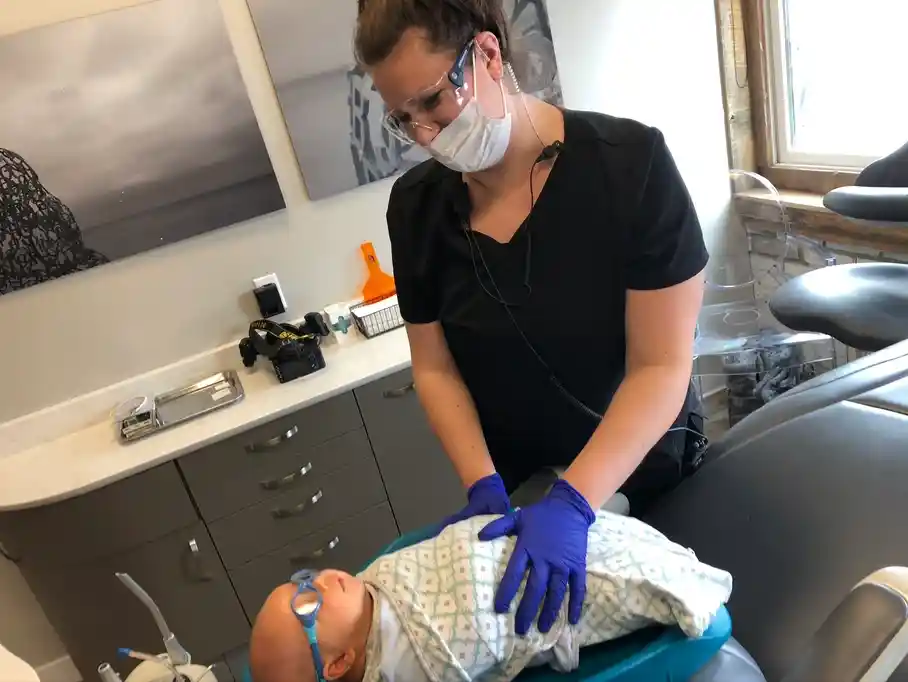A tongue-tie is not just a clever saying for someone who can’t quite find the words to say. It’s also a physical ailment that can restrict eating, swallowing, talking and other essential activities we perform with our mouth every day. Typically, if your baby has a tongue-tie or a lip-tie, it’s best to resolve it before it creates problems in the child’s development.
All new parents should know what tongue-ties and lip-ties are and how to check their child for one. Here’s what you need to know about tongue-ties and lip-ties in infants.
Why does a dentist care about Tongue or Lip Ties?
One of the biggest reasons we are concerned about ties in the mouth is they can impact growth and development of the jaw! The ability of the tongue to elevate to the palate expands the jaw bone, allowing for more room for the teeth, better breathing and sleep, and a healthy TMJ. Jaw growth happens EARLY, with 75% being complete by age 6. When we can catch ties early, we can capitalize on this growth period.
What Is a Tongue Tie or Lip Tie?
Your tongue and your lips connect to the rest of your mouth by a part of the body called a frenulum. A frenulum is a soft tissue that feels almost like a cord.
You have multiple frenulums in your mouth: one for the top lip, one for the bottom lip, and one for the tongue, and some in the cheek areas. You can find them on yourself by moving your tongue, inside your mouth, to the area directly above your two front teeth, between your lip and gums. Another is below the front-most bottom teeth (again, between your teeth and gums), another is below your tongue, and some are near your canines or premolar areas.
When one or more of the frenulums is too tight, then you have a tongue-tie or lip-tie (i.e., a symptomatic restrictive frenum, or multiple are called frena). A tongue-, lip-, or cheek-tie restricts the proper movement of your mouth and can impact your health in many ways. Current research is pointing towards 42% of people having a tongue-tie or lip-tie. You may have gotten through childhood with a moderately restricted frenulum. However, a baby with this condition can develop very serious problems.
If the lingual frenulum (the one under the tongue) is too tight, then your child may experience difficulty speaking, eating, drinking and breathing. Most notably, your infant may have trouble breastfeeding and bottle-feeding.
If the labial or buccal frena (those under the lips and cheeks) are too tight, then it can impact the long-term dental health of the child. The frenum can pull at the gums and expose the roots of the teeth, it can impact how well a child can latch at the breast, and it can contribute to open mouth posture (unhealthy breathing patterns!)
Signs Your Baby Has a Tongue-Tie or Lip-Tie
In babies, tongue-ties and lip-ties that interfere with the proper function of your child’s mouth may present with these symptoms:
- Difficulty maintaining a latch on breast or bottle
- Poor quality of latch with breast or bottle
- Improper seal/leaking milk from the nipple
- Failure to thrive, poor weight gain
- Pain on breastfeeding
- Mastitis, clogged ducts, changes in supply
- Excessive gassiness, reflux, spitting up, colic
- Frustration at the breast
- Choking, gulping, gasping at the breast
- Clicking, gumming, chewing nipples
- Falling asleep at the breast with short sleep cycles
- Frequent of extended nursing cycles
- White coating on the tongue
- Inability to flange upper or lower lips
What Should I Do If I Think My Baby Has a Tongue-Tie or Lip-Tie?
We can check to see if your child has a tongue-tie or lip-tie. If that’s the case, we can perform a quick procedure to correct it. This is called a frenectomy. To learn more about what’s included in a frenectomy procedure, visit this page here.
If you have questions about tongue-ties and would like to know more, see our most frequently asked questions about tongue-ties.
Schedule a consultation with Dr. Liz Turner to see if a tongue-tie might be what’s causing feeding or other issues in your child.






